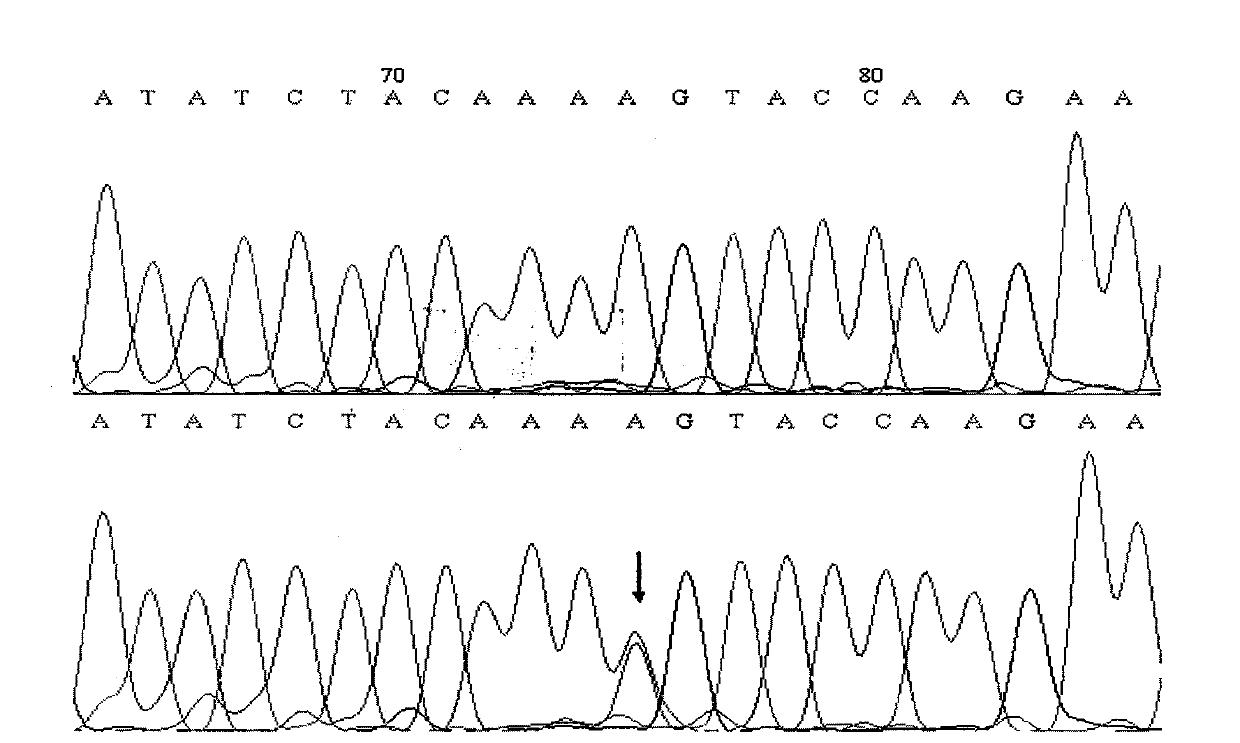Reagent case for detecting 1594A >C mutation of large vestibular aqueduct related gene SLC26A4
A technology of aqueduct and kit, which is applied in the field of kits for detecting SLC26A4 mutation gene, and can solve problems such as changes in membrane labyrinth structure
- Summary
- Abstract
- Description
- Claims
- Application Information
AI Technical Summary
Problems solved by technology
Method used
Image
Examples
Embodiment 1
[0059] [Example 1] Detection method for 349delC heterozygous mutation of SLC26A4 gene
[0060] 1. Preparation of blood sample DNA of the subject to be tested
[0061] 1. Research objects: 70 patients with enlarged vestibular aqueduct collected from the Deaf Clinic, and 85 normal controls. All participants were investigated in detail about their medical history and family history, and a physical examination was performed on them. The otological examination included otoscopy and audiological evaluation. After signing the informed consent form, 5-10ml blood samples were collected from each person.
[0062] 2. Genomic DNA extraction: using phenol-chloroform extraction method.
[0063] first day
[0064] 1) Anticoagulant blood was diluted 1-fold with PBS.
[0065] 2) Add 2 times the volume of lymph separation solution (18°C-28°C) into the centrifuge tube, spread a layer of 1 times the volume of diluted blood on top, centrifuge at 1000×g at room temperature for 20 minutes.
[0...
Embodiment 2
[0147] [Example 2] Research on the evolution of mutation sites
[0148] Mutation analysis: using Seqman in the DNAStar5.0 (Lasergeneinc.) software package TM software for sequence comparison analysis. The sequence obtained by sequencing was compared with the standard sequence retrieved by NCBI to find out the mutant sequence and the mutation site (349delC, X125).
[0149] Evolutionary research: The 349delC mutation is located in the second transmembrane region of Pendrin, which causes a frame shift in the amino acid sequence from position 117, and then ends prematurely at amino acid position 125. This mutation must affect the structure and function of Pendrin.
[0150] Detection of 1594A>C heterozygous mutation in SLC26A4 gene
[0151] A patient with an enlarged vestibular aqueduct was used as the research object. Through the screening of the exons of the coding region of the SLC26A4 gene in 70 family members of the disease and 70 normal controls, a patient with an enlarged...
Embodiment 3
[0152] [Example 3] Detection method for 1594A>C heterozygous mutation of SLC26A4 gene
[0153] See Example 1 for basic methods and steps; PCR amplification primer sequences for exon 14 of the SLC26A4 gene:
[0154] Upstream primers:
[0155] PDS14-F: 5'-CAAAATACGGCTGTTCCAAA-3'(nt37358-nt37377)
[0156] Downstream primers:
[0157] PDS14-R: 5'-AATGGAGCTGCTGAAACTTC-3'(nt37524-nt37543)
[0158] The PCR reaction process is shown in Figure 3; the agarose gel electrophoresis patterns of electrophoresis and quantification of the PCR products are shown in Figure 4 ; Sequencing diagram see Figure 5 .
PUM
 Login to View More
Login to View More Abstract
Description
Claims
Application Information
 Login to View More
Login to View More - R&D Engineer
- R&D Manager
- IP Professional
- Industry Leading Data Capabilities
- Powerful AI technology
- Patent DNA Extraction
Browse by: Latest US Patents, China's latest patents, Technical Efficacy Thesaurus, Application Domain, Technology Topic, Popular Technical Reports.
© 2024 PatSnap. All rights reserved.Legal|Privacy policy|Modern Slavery Act Transparency Statement|Sitemap|About US| Contact US: help@patsnap.com










